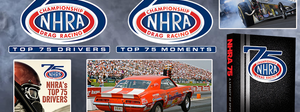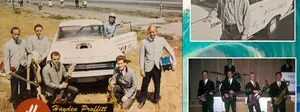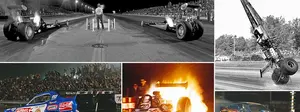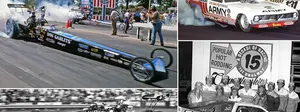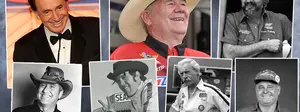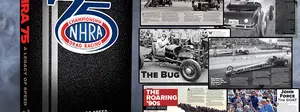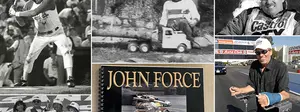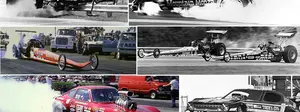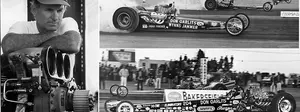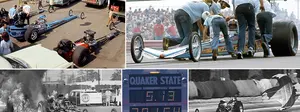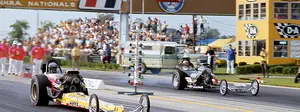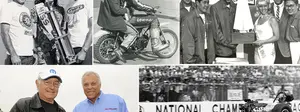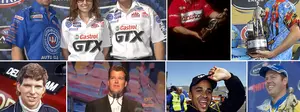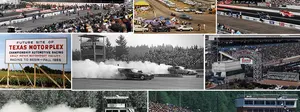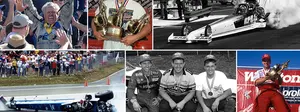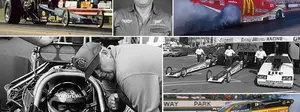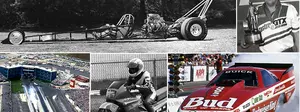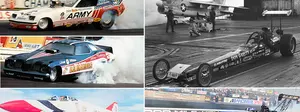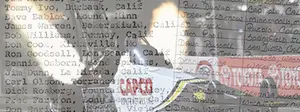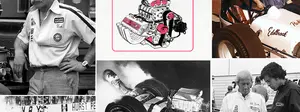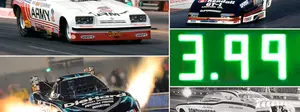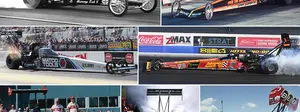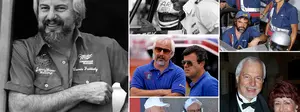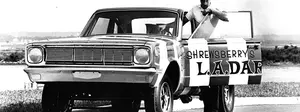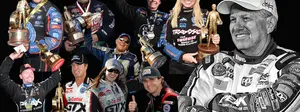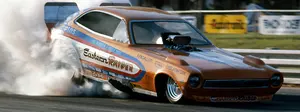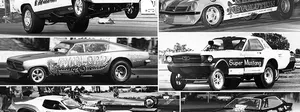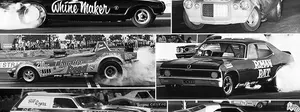Getting off a fast start: A historic look at early-season dominators
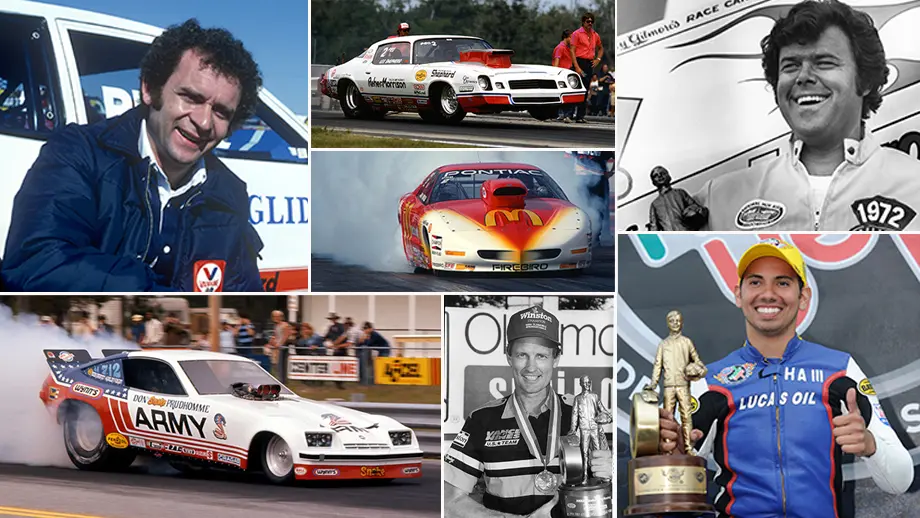
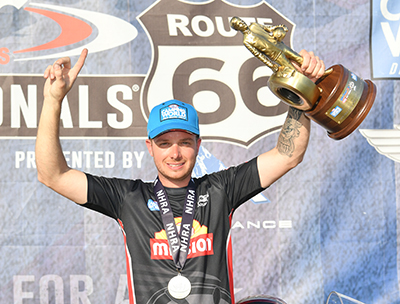
The NHRA world is abuzz this season with the fast start of second-year Pro Stock Motorcycle rider Gaige Herrera, who has won all three national events since taking over the saddle of the Mission Foods/Vance & Hines Suzuki. In addition to his wins in Gainesville, Charlotte, and Chicago last weekend, he also won the Mission #2Fast2Tasty NHRA Challenge in Chicago to boost his round-win record to an impressive 13-0, with 11 of them in points competition.
Herrera’s slingshot start is not unprecedented in NHRA competition, but it’s exceedingly rare. In the 59 seasons since the schedule included more than two events, only 13 times has a driver won three or more events to start a season, and it’s only happened twice in the last 25 seasons and most recently 10 years ago.
Here’s a historic look at the other fast starts in NHRA history:
Ronnie Sox, Pro Stock, 1971
Consecutive event wins: 3 | Consecutive round-wins: 15
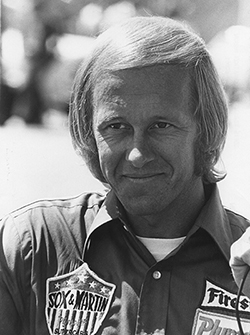
Ronnie Sox, who had accumulated six wins in Super Stock between 1964 and 1969, carried that success into Pro Stock’s inaugural season in 1970. He didn’t win until the Dallas-based Springnationals, the third race of the season, and won twice more, including the World Finals, which earned him the world championship.
Sox opened the 1971 season by winning the first three races on the schedule — the Winternationals, Gatornationals, and Springnationals — and three others that year (for a total of six of eight) but did not win the world championship due to a semifinal loss at the World Finals.
The Sox & Martin Barracuda dominated qualifying at the 32-car Winternationals, taking the No. 1 spot with a 9.812, more than a tenth ahead of teammate Herb McCandless’ 9.943 and low e.t. of the meet. On race day, Sox sat down Dick Brannan’s Maverick, Bob Lambeck’s Mopar, Bill Jenkins’ Camaro, No. 3 qualifier John Petrie’s Barracuda, and, in the final, Wally Booth’s Camaro, 9.86 to 10.02.
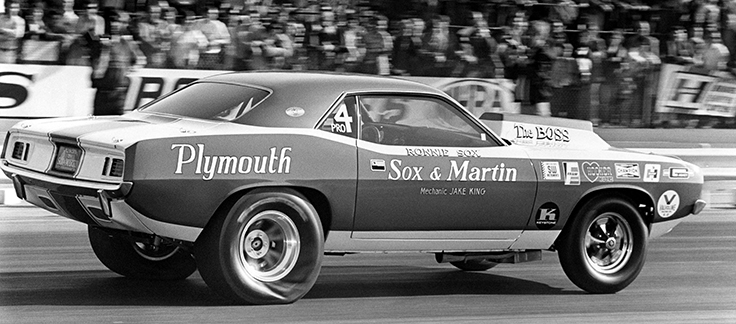
Sox topped the 16-car Gatornationals field as well with a 9.57 — again low e.t. of the meet, but just three-hundredths quicker than Don Carlton’s Motown Missile Dodge Challenger. Sox beat Melvin Yow, Arlen Vanke, and Booth again to reach the final against Carlton, who had whipped Jenkins, Petrie, and Reid Whisnant. Carlton had outperformed Sox in the semifinals, 9.60 to 9.61, in their respective victories, but Carlton, a former Sox & Martin team driver himself, inadvertently had the Clutchflite transmission lever in the wrong gear when the light turned green in the final and his bogged-down 10.31 trailed Sox’s 9.60 to the stripe.
Carlton and Sox both clocked 9.613 passes in Dallas to lead the 32-car field, but Carlton’s slightly faster speed — 142.83 to 142.63 — earned him the No. 1 spot. Carlton red-lighted to Don Grotheer in the semi’s, while Sox mowed his way past Jim Hayter, Butch Leal, Arlen Vanke, and Melvin Yow to face off with “Dyno Don” Nicholson’s Maverick in the final, where Sox emerged victorious, 9.70 to 9.78. A lot of people knew the results immediately, as, for the first time, live radio drag racing coverage, by the Diamond P radio network, was broadcast on stations coast to coast accompanied by live television coverage of eliminations in 90 markets.
After qualifying fourth and winning the first round at the Summernationals, Sox’s winning streak ended ingloriously at 15 rounds with a flat tire on the starting line against Ronnie Lyles.
Ed McCulloch, Funny Car, 1972
Consecutive event wins: 3 | Consecutive round wins: 15
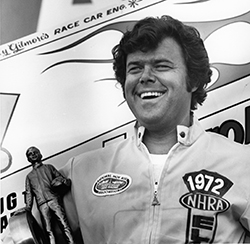
Nitro racing legend Ed “the Ace” McCulloch matched Sox’s opening hat trick the following year with wins at the Winternationals, Gatornationals, and the Springnationals, which had moved to Columbus.
McCulloch overcame early woes to qualify sixth in Pomona in 1972 with a last-ditch 6.93, almost a tenth behind polesitter Pat Foster's 6.84 in Barry Setzer's Vega. "The Ace" trumped “the King,” Jerry Ruth, in round one in Pomona then blasted to a track-record 6.65 in round two to beat Butch Mass, then beat Jake Johnston, at the wheel of Snow's second Dodge Charger to reach the final against Dale Pulde in Mickey Thompson's AHRA Winternationals-winning Pinto, where McCulloch prevailed in a lopsided final, 6.68 to 7.22.
Between Pomona and Gainesville, McCulloch, after a falling out with partner Art Whipple, also won the March Meet in Jim Murphy’s Holy Smokes Barracuda (McCulloch’s 1971 mount) then returned to the Revellution Duster in Gainesville. McCulloch qualified No. 3 behind Foster and Maas, then took down Lew Arrington's Brutus Mustang to face Foster, who had just made the quickest pass in Funny Car history with a 6.52 in beating Don Schumacher. McCulloch had run a best of 6.6 in round one, and his streak probably would have ended there had Foster's engine not caught fire during the start-up, forcing him to shut off. McCulloch singled into the final, where his stout 6.54 defeated Larry Arnold’s 6.68 in the Kingfish 'Cuda.
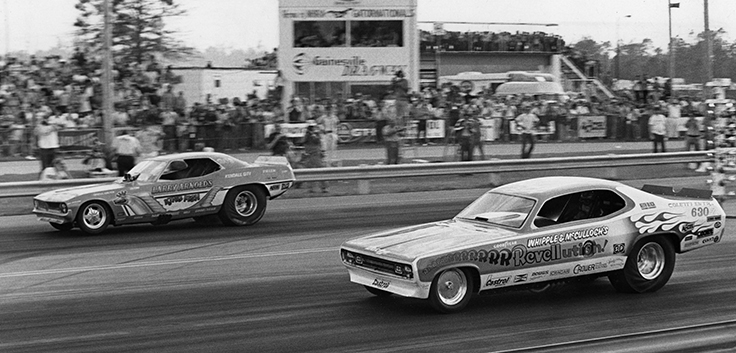
McCulloch then won the Springnationals, sitting down Gary Henderson and Johnston in the first two frames to set up with Foster a rematch of their missed tangle in Gainesville. Foster again had qualified No. 1, at 6.67, low e.t. of the meet, but again the race was over before the green, this time because of a rare red-light by Foster. In the final, McCulloch put away tire-smoking Leonard Hughes to run his record to a perfect 12-0.
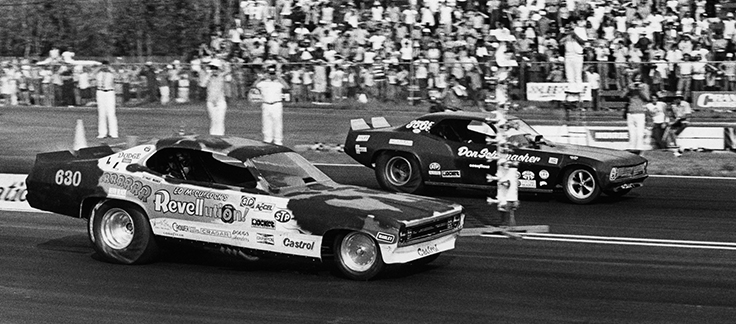
McCulloch ran his round streak to 15 by reaching the Summernationals final, which in and of itself was pretty miraculous as a booming blower explosion at a match race the week before had shredded the Duster body. McCulloch had repaired the body himself then worked his way to the final to face Don Schumacher, whose mount also had been heavily damaged the weekend before in a crash. Schumacher got the better of "the Ace" in the final round, 6.63 to 6.84, to end his amazing string.
With the championship still decided by who won the World Finals, even McCulloch’s blistering start, like Sox’s, did not end in a championship.
Don Prudhomme, Funny Car, 1975
Consecutive event wins: 3 |Consecutive round-wins: 12
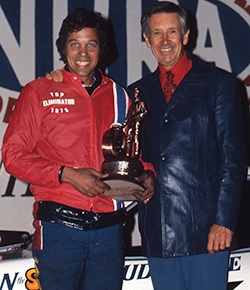
Don “The Snake” Prudhomme started two of the most dominating seasons in NHRA history by winning the same three races that Sox and McCulloch had won but, because this was now the era of points-scored championships, Prudhomme’s hot starts helped propel him to his first of four straight Funny Car titles.
Prudhomme’s vaunted Army Monza was dominant thanks to an early version of a “lock-up clutch”-style combination that he and Bob Brandt had developed.
Ten years after his breakthrough first win in Top Fuel at the 1965 Winternationals, Prudhomme was back in the Pomona winner’s circle after working his way past Billy Meyer (subbing for Gene Snow, who had back ailments), Neil Lefler, and Charlie Therwanger then beat Mike Miller in Jim Green’s Green Elephant, which settled for runner-up honors in Pomona for the second straight year (also in 1974, with Frank Hall driving). Prudhomme ran 6.28 and 6.24 in the final two rounds; the closest anyone got to that was Therwanger’s 6.32 in round two; everyone else was in the 6.40s and above.
After qualifying No. 2 in Pomona behind Bill Leavitt, Prudhomme was back on pole in Gainesville and waltzed past a trio of Toms — Grove, Raley, and, in the final, Prock (plus reigning world champ Shirl Greer in the semi’s) — and again was never seriously challenged. Just as McCulloch’s streak could have ended in Gainesville had Foster’s car not caught Fire, “the Snake” string also should have been halted in the Gainesville final when he was shut off with an oil leak. As Prock took a pre-celebratory dry hop to the line for a solo, he broke the rear end. Officials gave both teams 30 minutes to repair their woes, and while Brandt just had to tighten a line, the Custom Body team could not change out the damaged rear end, and Prudhomme soloed to victory.
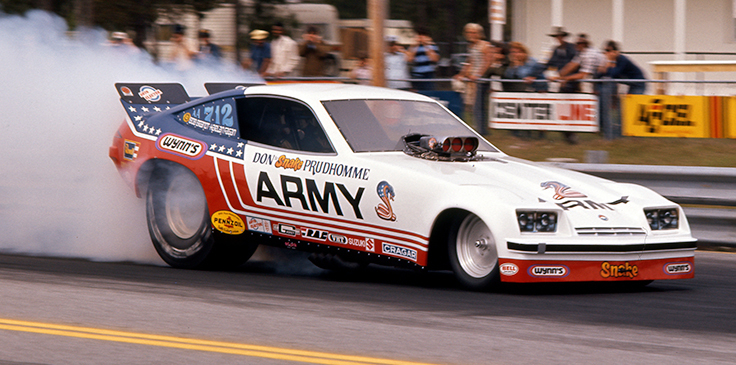
Prudhomme had a tenth on the field in Springnationals qualifying (6.29 to McCulloch’s 6.41) and beat “Jungle Jim” Liberman (in one of his rare national event appearances), Jim Nicoll, Greer (again), and then the guy who was rapidly becoming his nemesis, Raymond Beadle, in the final. In that memorable money run, Beadle launched into a big wheelstand and pitched the Blue Max Mustang II body off a hundred feet into the run.
After qualifying No. 1 at the Summernationals in Englishtown, Prudhomme suffered one of his rare losses to “the Mongoose,” Tom McEwen, in round one, ending his winning streak at 12 rounds.
Prudhomme went on to win three of the remaining four races — being stopped only by Beadle in the Indy final — to finish with six wins in eight races and his first championship and also recorded the class' first five-second run at the World Finals.
Don Prudhomme, Funny Car, 1976
Consecutive event wins: 5 | Consecutive round-wins: 22
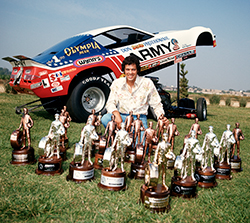
How could Prudhomme possibly top his six-of-eight 1975 season? By winning seven of eight, of course, which he did in the most dominant season in Funny Car history.
Prudhomme won the first five consecutively: Winternationals, Gattornationals, Springnationals, Summernationals, and Le Grandnational with respective final-round defeats of McCulloch, Greer, McEwen (back-to-back), and Prock.
The Winternationals win was his second of what would be four in a row, and the Gators triumph was his third in a row there. He’d never won the Summernationals before 1976, but then went on to win it five times over the next seven years, and his win in Montreal was his second straight in a string of six wins in eight years north of the border.
How dominant was he in those first five events? He had low e.t. and top speed at all five and qualified No. 1 at four of the five, outdone only by Gary Burgin at the Gatornationals, where Prudhomme’s 6.31 was behind only Burgin’s 6.29.
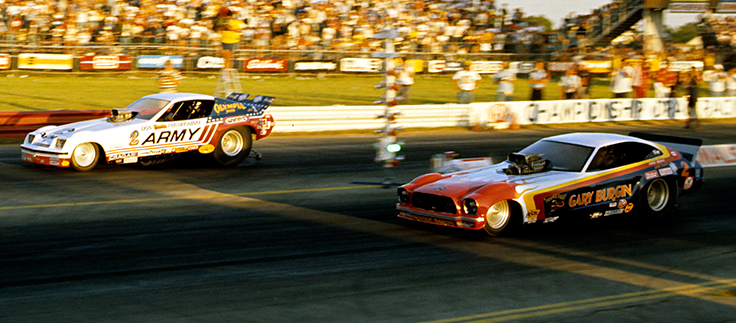
Burgin also ended Prudhomme’s bid for a perfect season, stopping him in the Indy final as Beadle had done the year before. Prudhomme had qualified No. 1 in the quickest field in history (6.26 bump) with a national record 5.97, a full tenth ahead of Beadle’s second-ranked 6.07, then raced past Tom Hoover, Gordie Bonin, and Ron O’Donnell with runs of 6.05, 6.13, and 6.15 before shaking the tires to a 6.46 loss against Burgin’s 6.25, ending “the Snake’s” winning streak at 22 rounds.
Combined with his wins at the final two events of 1975, Prudhomme racked up 30 straight round-wins over the two seasons, which still stands as the longest winning streak in Funny Car history.
Prudhomme would go on to win in Seattle and Ontario to finish 1976 with seven wins in eight starts and a 30-1 round-win record.
Bob Glidden, Pro Stock, 1979
Consecutive event wins: 4 | Consecutive round-wins: 16
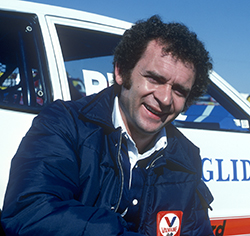
Bob Glidden was in the middle of a record-long winning streak dating back to the last five events of 1978 when he won the first four events of 1979. He had won in Englishtown, Montreal, Indy, Seattle, and Ontario in his incredible Ford Fairmont to close out his third world championship. He switched to a new Plymouth Arrow for the 1979 season and won in Pomona (over Joe Satmary in the final for Mopar’s first win since 1973), Gainesville (Ronnie Sox), Baton Rouge (Lee Shepherd), and Columbus (Shepherd again) to kick off 1979.
He had won 19 straight rounds and also had been the No. 1 qualifier and set low e.t. at those final five 1978 events, and that same No. 1/Low e.t. performance binge continued through the four 1979 wins (he also set top speed at three of the four) as he racked up 15 more round-wins (the Cajun Nationals was an eight-car field) before heading to Denver.
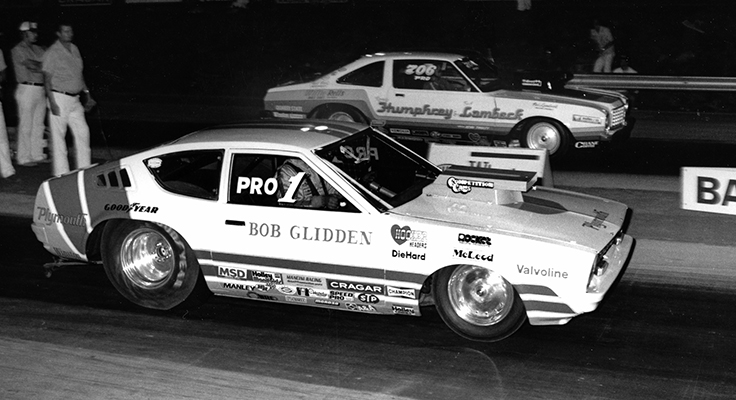
Glidden again qualified No. 1 at the Mile-High Nationals — his 9.08 more than a tenth ahead of Sonny Bryant’s 9.20 — but Saturday’s final eliminations day (they didn’t use to run on Sundays at Bandimere Speedway for religious reasons) was delayed by five hours of rain and didn’t finish until early Sunday morning. Glidden defeated Don Nicholson in round one, and his 9.12 was two-tenths better than the next quickest winner, but he inexplicably red-lighted against Randy Humphrey’s Plymouth Volare in the semifinals, ending his 1979 streak at 16 rounds and his overall winning streak at 35, which is still the longest in NHRA Pro-class history.
Before Glidden lost on June 30 in Denver, he hadn’t lost a national event round since the final round of the Springnationals the previous June 11!
Lee Shepherd, Pro Stock, 1980
Consecutive event wins: 3 | Consecutive round-wins: 14
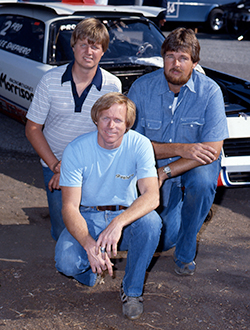
If the late 1970s belonged to Glidden, the early ‘80s were owned by Lee Shepherd and partners David Reher and Buddy Morrison and their white Camaro. They would win four straight championships (1981-84) and the fact that storm was brewing was evident in 1980 when they won the first three races of the season — beating no-showing Kevin Rotty in Pomona, eventual world champ Glidden in Gainesville, and Frank Iaconio in Baton Rouge, La. — and six total that season yet still finished second behind Glidden.
Rotty had out-qualified the field in Pomona — setting low e.t. and top speed — and looked good in eliminations but couldn’t make the final-round call against Shepherd (who had beaten Glidden in the semi’s) due to suspension damage.
After qualifying second behind Glidden in Gainesville, Shepherd and the R-M-S went steadily quicker on Sunday — 8.61, 8.57, and 8.50 — but Glidden had twice gone 8.48. Yet, in the final, Shepherd banged the gears to a narrow 8.516 to 8.519 victory.
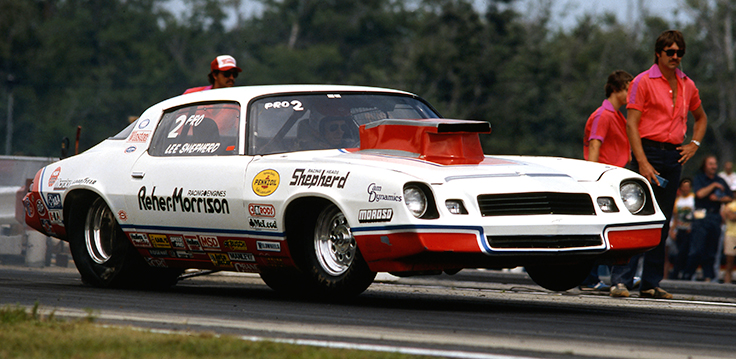
Shepherd qualified just fifth in the eight-car Cajun Nationals fields and drew — and defeated — Glidden in round one on a huge 8.59 to 8.49 holeshot then beat Rotty and Iaconio, the latter on another holeshot, 8.60 to 8.55.
Shepherd’s streak came to an end in Columbus in the final round. After beating Sam Gianino, Ronnie Sox, and Rotty to extend his round-win streak to 14, Glidden beat him in the final, 8.53 to 8.62. The win was Glidden's second in a row out of what would turn out to be five straight wins at National Raceway extending to 1983.
Frank Hawley, Funny Car, 1983
Consecutive event wins: 3 | Consecutive round-wins: 11

A year after stunning the troops with their rags-to-riches 1982 championship run, Frank Hawley, Austin Coil, and the Chi-Town Hustler gang launched their 1983 title defense with wins in Pomona, Gainesville, and Atlanta.
Tom Anderson in Jim Wemett’s Mercury LN-7 dominated early Pomona action, qualifying No. 1 (5.88 to Hawley’s second-ranked 5.97) and ran the only five of round one (5.96 to Hawley’s 6.08), but Coil found the tune-up, and they pounded out a trio of 5.93s to cool the hot wheels of Don Prudhomme and Tom McEwen and, in the final, Anderson, who lost with a 6.02.
After qualifying a distant ninth in Gainesville, they hustled past Mark Oswald, Raymond Beadle, and Mike Dunn with a blizzard of low 5.90s, and capped the day with a 5.92 to 5.96 defeat of Dale Pulde.
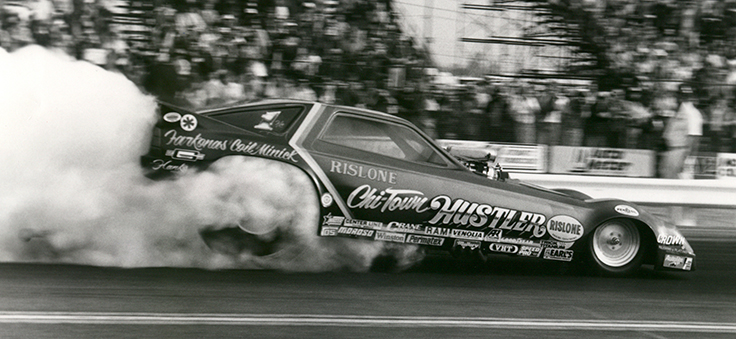
Hawley also started the Southern Nationals with a disadvantage, ranked just sixth in the eight-car field, but got by red-lighting Oswald, alcohol-racing legend Ken Veney, and, in the final, Al Segrini.
After skipping the Cajun Nationals (back then, racers could earn points at any 10 of the 12 national events or nine events and the two “bonus” mini-events), Hawley’s streak ended at 11 in round one of the Springnationals, where Anderson avenged his final-round loss in Pomona.
Darrell Alderman, Pro Stock, 1991
Consecutive event wins: 3 | Consecutive round-wins: 15
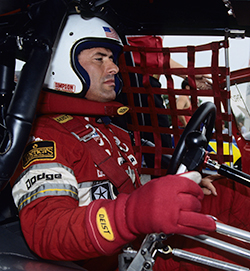
After winning the 1990 world championship and bringing Mopar back to the front of the Pro Stock class for the first time since Bob Glidden’s 1979 championship, Darrell Alderman and the Wayne County Speed Shop Daytona opened their title defense in 1991 with three straight wins, in Pomona, Phoenix, and Houston.
Alderman qualified No. 1 and set low e.t. in Pomona, then thrashed Harry Scribner, Mark Pawuk, and Tony Christian before taking a single in the final when Warren Johnson’s engine shut off behind the line in the final with an ignition problem. He beat Johnson again in the final round in Phoenix then beat W.J.’s protégé, Scott Geoffrion, in the Houston final. Alderman had low e.t. at all three races and qualified No. 1 at two of them, with W.J. edging him for the No. 1 spot in Houston.
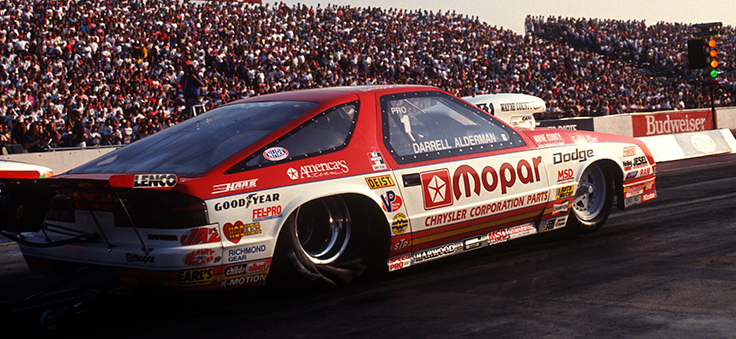
Alderman’s round-win streak ended at 15 in the Gainesville final round against Johnson. After beating Gordie Rivera, Rickie Smith, and Bob Glidden, Alderman fell to Johnson, 7.27 to 7.31.
Alderman won 11 races that season to claim his second championship but was haunted by legal issues throughout the year, which ultimately led to NHRA suspending his license for the 1992 and ’93 seasons, during which Geoffrion took his place on the team.
Dave Schultz, Pro Stock Motorcycle, 1991
Consecutive event wins: 4 | Consecutive round-wins: 18
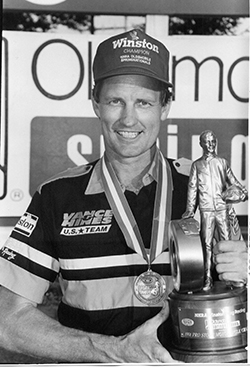
Dave Schultz was already a two-wheeled powerhouse with two championships (1987-88) and 10 wins under his leathers when he joined the powerhouse Vance & Hines team for the 1991 season. Schultz was allowed to keep riding his killer Kawasaki until V&H got a bike of their favored brand, Suzuki, ready for him.
Schultz won the first four events of the season — Houston, Gainesville, Atlanta, and Columbus — beating longtime rival John Myers in the final of the first three and Jim Bernard in the fourth.
Schultz had low e.t. at all four events and was the No. 3 qualifier three times (qualifying second behind Myers in Atlanta) during his streak.
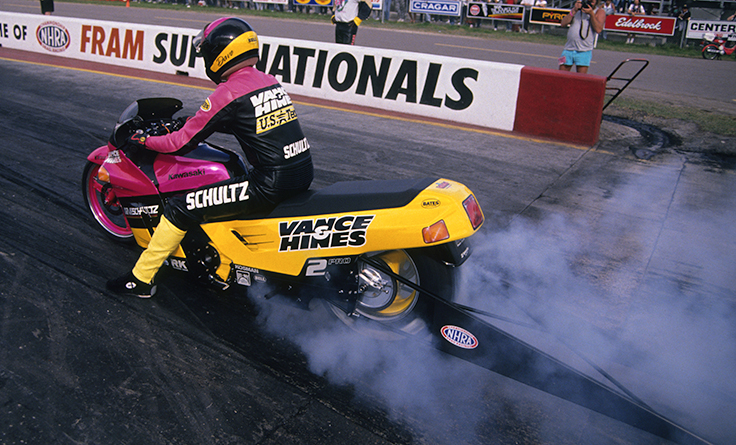
Schultz finally switched to the Suzuki before the Summernationals and seemed like he didn’t miss a beat. Although he qualified No. 2 behind Myers again, he worked his way to the semifinals but broke there against Bernard, ending his winning streak at 18 rounds.
Schultz would finally win aboard the Suzuki in Dallas in 1991 en route to his third of six championships.
Schultz would later go on to win 34 straight rounds during an eight-race winning streak in 1994; it’s still the class record.
Jim Yates, Pro Stock, 1996
Consecutive event wins: 3 | Consecutive round-wins: 14
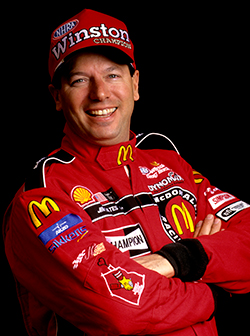
Jim Yates became the first Pro Stock world champion in 18 years not named Glidden, Shepherd, Alderman, or Johnson when he won the 1996 title in his McDonald’s-backed Pontiac, with a three-race winning streak springboard to start the season.
After winning the preseason Super Bowl testing event in Houston with six six-second passes, Yates won in Pomona, Phoenix, and Gainesville.
No one ran in the sixes in Pomona (Warren Johnson had low e.t. at 7.01), but Yates rode a string of 7.0s to beat Bob Glidden, Kurt Johnson, W.J., and surprise finalist Billy Huff.
Yates qualified just fifth in Phoenix, then beat Huff (again), Chuck Harris, Troy Coughlin, and, in the final, Tom Martino, with a 7.05 that was just shy of W.J.’s 7.04 low e.t.
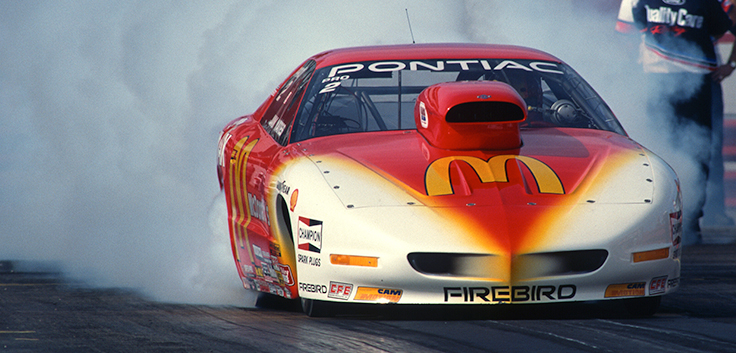
W.J. ran the only six in Gainesville to qualify No. 1, but once again, it was Yates’ blitz of low 7.0s that ruled race day as he took down Pete Williams, Jerry Eckman, Rickie Smith, and Steve Schmidt. (Johnson lost on a first-round holeshot to co-rookie of the year Mike Edwards.)
Yates’ return to Houston did not go the way it did in the Super Bowl. Yates reached the semifinals but fell there to Edwards, thanks to a broken camshaft at half-track, ending his winning streak at 14 rounds. Edwards went on to defeat Ray Franks for his first Pro Stock title.
Matt Hines, Pro Stock Motorcycle, 1998
Consecutive event wins: 3 | Consecutive round-wins: 12
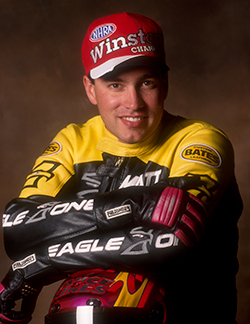
The Vance & Hines team was back for another hot start, this time with second-generation rider Matt Hines, the defending world champ, twisting the throttle to wins in Gainesville, Atlanta, and Richmond, the first three races on the bike calendar that season.
Hines swept the performance honors — low e.t., top speed, and No. 1 qualifier — at all three races, and his field-leading 7.245 in Gainesville and first-round 187.57-mph run there were both national records.
Hines’ Suzuki led Gatornationals qualifying by eight-hundredths over Angelle Sampey (née Seeling) and rode past Larry Cook, Tony Mullen, and Paul Gast to defeat Dave Schultz in the final, 7.31 to 7.42.
In Atlanta, he steamrolled Clarke Paris in one, benefitted from a Tony Mullen red-light in round two, then beat John Myers in the semifinals and Gast in the final.
Hines victimized Clark and Gast again in the first two rounds in Richmond, then bested Myers — who tragically would die less than four months later in a highway motorcycle accident — in the semi’s before Seeling red-lighted to him in the final round.
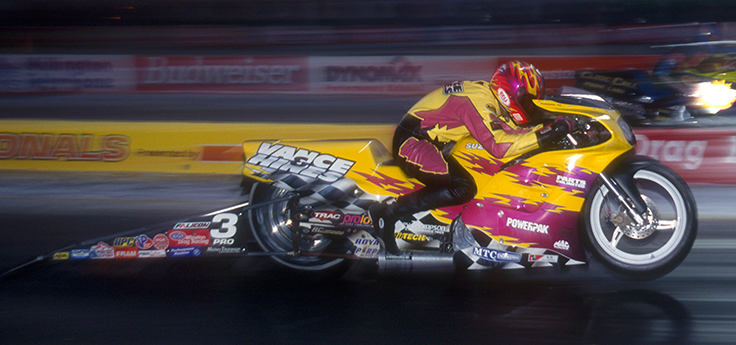
Hines qualified No. 1 for the fourth straight time to lead the Summernationals field but lost in round one to No. 16 qualifier Gary Tonglet (whose son, G.T., would later become a Vance & Hines rider) with a broken transmission (after honestly admitting to damaging it by double-clutching) to end his victory streak at 12 rounds.
(Worth noting: Between the Gainesville and Atlanta race, Hines also won the non-points Winston Invitational event in Rockingham, N.C. (beating Seeling in the final), so one could possibly and reasonably say that Hines’ winning streak encompassed 15 rounds.)
Hines’ fast start in 1998 also was the continuation of his late ’97 finish in which he won the season’s final two events — in Memphis and Pomona — meaning he won five straight national events and had an overall round-win streak of 20 rounds (23 if you count the Invitational).
(Also worth noting: Hines’ younger brother, Andrew, combined with teammate Eddie Krawiec to win each of the first 11 races of the 2012 season and 15 of the season’s 16 races.)
Hector Arana Jr., Pro Stock Motorcycle, 2013
Consecutive event wins: 3 | Consecutive round-wins: 11
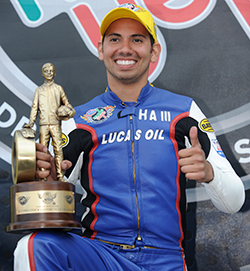
Five years before he would break the Pro Stock Motorcycle 200-mph barrier there, Hector Arana Jr. kicked off a three-race winning streak at the 2018 season opener at Gainesville Raceway.
After qualifying No. 2 by just a thousandth of a second behind eventual season champ Matt Smith (who exited in round one), Arana took down Michael Phillips, Eddie Krawiec, then his own father, Hector Sr., to reach the final, where he defeated Steve Johnson.
After qualifying No. 1, Arana then won the Four-Wide Nationals in Charlotte, finishing ahead of Eddie Krawiec, Scotty Pollacheck, and Jim Underdahl in the final quad.
Arana continued to roll in Houston, where he again qualified No. 1 and beat Shawn Gann, Hector Sr., and John Hall to face off with No. 2 qualifier Pollacheck and won that race going away, 6.91 to 6.98.
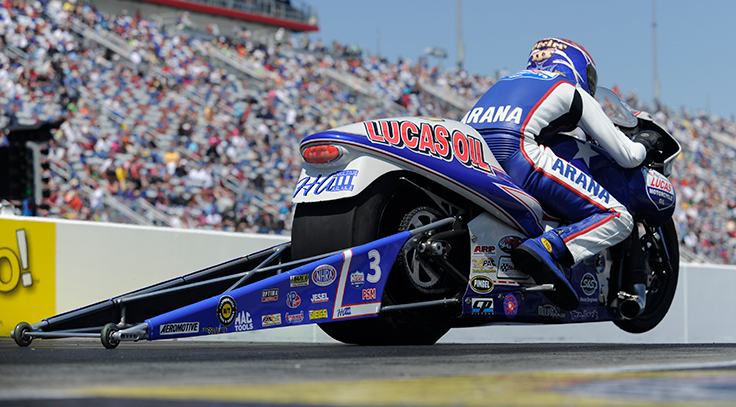
Arana’s winning streak ended in Englishtown in round one to, of all people, his father, stopping his winning streak at 11 rounds.
Arana’s fast start and subsequent wins in Denver and Sonoma kept him in the points lead for the first 12 races until the wheels came off in the Countdown to the Championship, where he won just two rounds in the season’s final four races and slipped to a disappointing fourth-place finish.
How far can Herrera go? To pass Schultz’s near-30-year-old record of 34 straight round-wins, he’ll have to win the class’ next six races: Bristol, Norwalk, Denver, Sonoma, and Indy. So far, no one has seriously challenged him, but it’s a long way to Labor Day.
Phil Burgess can be reached at pburgess@nhra.com
Hundreds of more articles like this can be found in the DRAGSTER INSIDER COLUMN ARCHIVE
Or try the Random Dragster Insider story generator



